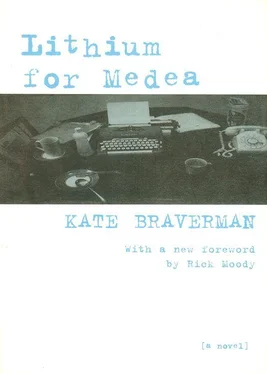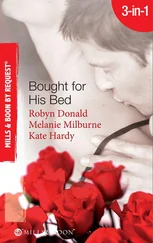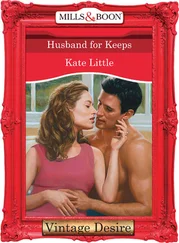I was thinking about the clock embedded in the wall, permanently wide-eyed and somehow accountable.
“You look terrible,” Francine observed.
I almost smiled. Our interaction had become stylized. We spoke by analogy, by nuances so coded and odd we reinforced our alienation with each breath. We spun in the same old cruel circles.
Once I left Gerald during a particularly virulent period of our life. The National Guard was stationed on the street corners of Berkeley. They slept in tents three blocks from our apartment. The men wore uniforms. They carried rifles with bayonets. They rode in special army trucks. The city resembled newsreels of World War II in Europe. A banner saying WELCOME TO OCCUPIED PRAGUE was strung across the front of our apartment house.
Gerald and I had been fighting all week. I think we still slept in the same bed then. I seem to remember his back, white by the streetlamp glow.
“Is it me?” I kept asking him. I was sitting up and rocking myself in the darkness. “Why don’t you go to a doctor? Why don’t you just try?” And rocking in the darkness thinking he should do it, why isn’t he doing it, trial and error, the scientific method, what the hell was the matter? Gerald wasn’t even playing by his own rules anymore.
“You don’t fully appreciate cosmic rhythms. Be patient,” Gerald said to the wall. He sounded disappointed and tired.
Patient, I thought. Patient? And I walked into the living room. Slowly, deliberately, as if dusting, I picked up our lamp and let it fall to the floor. The pottery base shattered.
Gerald stormed into the room. He was wearing white jockey shorts. He always wore white jockey shorts like a white bandage. He looked somehow antiseptic, protected from thighs to waist. His hidden parts were safe, coiled tight, a small white secret. A secret that no longer seemed to matter.
“Are you crazy?” he demanded. He was staring at the fragments of what had once been our lamp. He touched the splinters with his foot. His lips twisted, as if tasting something terribly sour. Gerald hated waste.
Gerald was studying anthropology then. He was sitting on the brown sofa reading Claude Lévi-Strauss. I was interrupting him, placing obstacles in his path, the sacred quest for knowledge.
He ignored me. His white fingers moved slowly along the edges of the white pages. He was telling me silently with his shoulders and hands to leave him alone, just leave him alone. I watched his shoulders slump further into shadow. His left hand curled into a fist. Trembling and breathless, I persisted.
“There’s something wrong with you,” I screamed finally, feeling hollow.
Gerald let his book shut. Flap. A small white bird. It wasn’t that he couldn’t make love with me, his Las Vegas Palace of Marriage certified lawful bride, he explained. It was that he didn’t want to. There was a vital distinction there. It wasn’t a case of physical or emotional illness or weakness. There was no mind-body dichotomy.
It was a philosophical issue, a matter of his right to exercise free will. I was wrong. I had no sense of the ebb and flow of things. And who ordained that sex be a primary part of a relationship, anyway? I insisted only because of my middle-class American orientation, the Madison Avenue constructs that littered my brain like rat droppings.
I thought of my brain as an empty gray corridor strewn with land mines and hand grenades, fragmentation bombs, napalm. Gerald was still talking. It was late at night. He was facing the wall, his back to me, a white slab, a cliff, icy, untouchable. Americans made a mania of a simple inconsequential biological function. The Trobriand Islanders and Samoans weren’t like that. The natives of Saturn weren’t like that. Where was my anthropological sense?
“I thought you had potential once,” Gerald pronounced sadly into the darkness. “But you’re just like the others, waving their fat ugly breasts like leeches. You have to know the sand in order to exhaust it. Deaf men don’t retreat.”
I tried to get to the airport in the morning. I tried to get to the airport again in the afternoon. Each attempt left me exhausted. Classes had been suspended. I didn’t know where Gerald was. There were curfews. Six people had been shot. Helicopters were dropping clouds of CS gas. I was carrying my suitcase through streets blocked by the National Guard, through troop trucks and demonstrators, police, paddy wagons and dazed housewives. Parts of the city were sealed off by soldiers marching shoulder to shoulder, like a gigantic gray sausage slowly undulating forward, bayonets jutting from their rifles. I could see the sunlight glancing off their bayonets.
“You look terrible,” Francine told me at the airport. “And those shoes are a bad joke.”
I stared at my feet. I had never seriously considered the topic of shoe styles. I thought about primate social behavior, kinship designations and creation myths. I started crying.
Now I was sitting in the hospital cafeteria. The Formica tables were a pale yellow. We were drinking coffee from styrofoam cups.
“You hate my tennis racket, I can see that,” Francine said. “Do you want me collapsed? A hag in black? You got black in your eyes, kid. I got news for you. I keep going. I do more in a day than you do in a year.”
“What are the odds on the skin graft?”
“Good,” Francine said. “If the graft works the tubes go out. Then he gets to go home at some point.”
Home was the pastel house in West Los Angeles, the rooms sturdy, purposeful. Home was the black grapes growing wild at sunset in the shadows along the bamboo gate. Home was six P.M. Time for a shot of bourbon with the news.
I looked at Francine. She was balancing a hand mirror in her palm. She was putting on a reddish lipstick. I realized my head was nodding slowly, back and forth, making a kind of circle. I touched my forehead. I felt I needed a big white bandage wrapped across my head. A bandage to keep the jagged pieces from pushing out.
This is real, I thought, jolted by it. This is actually happening. It begins without warning. One lives as one has always lived, waking to an empty yellow morning, the sun a hammer. One pokes a dull head through a gray haze. A call is made. Someone says, Go to your father. He’s sick. He needs you. And suddenly there are two of you. One is small and terrified, a child who cries, don’t leave me, Daddy, I’m only six, Daddy, still sweeping leaves off the fall pavement in front of the gray stone house waiting for your car, waiting with Mommy. And you are waving, back again from building houses, paint spots on your pant legs, your toolbox full.
And there are two of you. Two of you sitting under a strange gouged metal eye planted in the wall. Tick. Tick. Tick. Tick. One is small, coiled up inside, hiding, screaming, Don’t die, Daddy. Don’t die. They’ll call me a woman if you die, not a little girl.
And the other body moves. The other finds the father slumped in his kitchen crying, angry and bitter, already half broken. It’s cancer, he says. It’s cancer again. And the whole world stalls.
“Fred and I really connect. I mean this guy is something else.” Francine leaned toward me. “He’s got a faster recovery rate in bed than a twenty-year-old. Meanwhile I’m letting him put me into energy.”
“Energy?”
“Alternative fuel sources. You know, Colette got very rich at the end. Stock tips. She knew certain men in government,” Francine mused.
“The skin graft,” I began. “Maybe if he sees the skin graft is working. Maybe he’s just preparing himself to die. Maybe he doesn’t believe he’s going to live.”
“Maybe,” Francine said cautiously.
Things lay unanswered between us. Debris collected in the small corridor of white air where our shoulders almost brushed. Something hung suspended. Three floors above, my father lay suspended, undecided about living or dying.
Читать дальше












